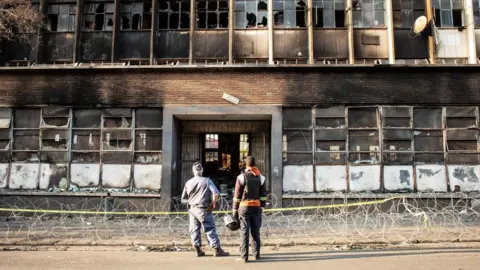Johannesburg fire: Hijacks and death traps in a crumbling South African city centre
 Getty Images
Getty ImagesJohannesburg's Central Business District is filled with buildings that look on the brink of collapse. Windows are boarded up and walls are covered in graffiti.
Streets are filled with detritus - food wrappers, empty beer bottles, cigarette butts - and a foul smell of rotten food combined with urine fills the air.
It is overcrowded, dangerous, and there are few working amenities.
And it is now the backdrop to one of South Africa's worst building disasters, when 76 people died and dozens more were injured in a fire that ripped through 80 Albert Street on Thursday.
The dilapidated complex was one of dozens that have been "hijacked" - taken over by criminals and property gangs who then rent out the space illegally to people who cannot afford anything else. There are often no reliable amenities, nor sanitation.
Molly, a 21-year-old South African who lives down the road from 80 Albert Street in another "hijacked" building, says it is like living in a prison.
"I won't have water to shower for long periods," she told the BBC. "And we live in the dark. Lots of us, in one room."
She was scared to use her full name for fear of authorities arresting her for living illegally.
Molly's building is one of the 57 that have been hijacked in the inner city, where up to 2,000 people can live in a single complex.
And in the aftermath of the latest deadly blaze, people wonder how so many are allowed to.
Squatters' rights
South Africa's Prevention of Illegal Eviction Act (PIE Act) is a starting point. It states that no person can be removed from their home without a court order.
And once a person is settled in a building and can prove they have nowhere else to go, they cannot be evicted.
This makes clearing hijacked buildings incredibly difficult.
Angela Rivers, the general manager at Johannesburg Property Owners and Managers Association, says the anti-eviction law is the root of the problem.
"You cannot evict anybody unless they have alternative accommodation, which needs to be provided by counsel [the prosecution]," she says.
"And that is where the mess comes in. Because counsel is incapable of providing any accommodation because their own accommodation has been hijacked."
The 80 Albert Street complex was owned by the City of Johannesburg, which means the city would have been responsible for finding alternative shelter for those evicted.
The building opened in 1954 as the Central Pass Office, which controlled the movement of black people in the city during apartheid.
South Africans used to go to collect a passbook, or a "dompas", that controlled where they could travel.
The building later became the home of the Usindiso Women's Shelter, before it was abandoned and taken over by criminal gangs.
 Reuters
ReutersJohannesburg has had a growing housing shortage since white-minority rule ended in 1994. Many black and mixed-race residents who lived in townships outside the city moved to the centre to be closer to where they worked.
Authorities say they are unable to meet the cost of the new affordable housing needed, and their hands are tied by eviction laws.
Critics, such as Ms Rivers, says the city simply refuses to tackle the problem.
"The PIE act is 25 years old. It's been giving us issues for 20 years. So you can't suddenly wake up 20 years later and say; 'Well, we are bound by this act'. They have known about it. It hasn't been sprung on them."
She says officials could start by doing inspections of public buildings and using even the few powers and bylaws they have to improve the lives of the people living in these buildings.
Kenny Kunene, a member of the opposition Patriotic Alliance who spent a weekend as acting mayor of Johannesburg in May, says that the anti-eviction law "protects criminals".
"Whenever the government acts, NGOs then go to court on an urgent basis to stop the government from evicting people.
"So at the root of the spread of illegal hijacking of buildings by illegal immigrants and South African criminals, is the property law that protects them."
He also wants mass deportation of immigrants who are living in the buildings. He sees the hijackers and their "tenants", as the same problem.
Rights groups say Mr Kunene's views are another example of rising xenophobia in the country which has an estimated 2.9 million migrants.
As the most industrialised economy in the region, it's an attractive destination for those seeking better work opportunities from as far afield as Nigeria and Somalia.
Victims, not criminals
Ms Rivers agrees that there is a "problem" with illegal immigrants.
"But it's not the illegal immigrants that neglected that building," she adds. "A lot of these tenants are desperate people who will pay money to put a roof over their head."
 Reuters
Reuters"They're just as much victims in this as the property-owner who's lost his building," she says.
And since many are undocumented and work in informal jobs, they are unlikely to come forward to ask for alternative accommodation that the government can provide for low wage earners.
President Cyril Ramaphosa visited the burnt remains of 80 Albert Street soon after the fire. He called for a thorough investigation to ensure there were no future tragedies.
"It's a wake-up call for us to begin to address the situation of housing in the inner city," he said.
However, he did not mention any specific steps that the government would take.
So while the investigation of what caused the fire continues, so will the blame game as to why so many of Johannesburg's residents are living in such unimaginable conditions.